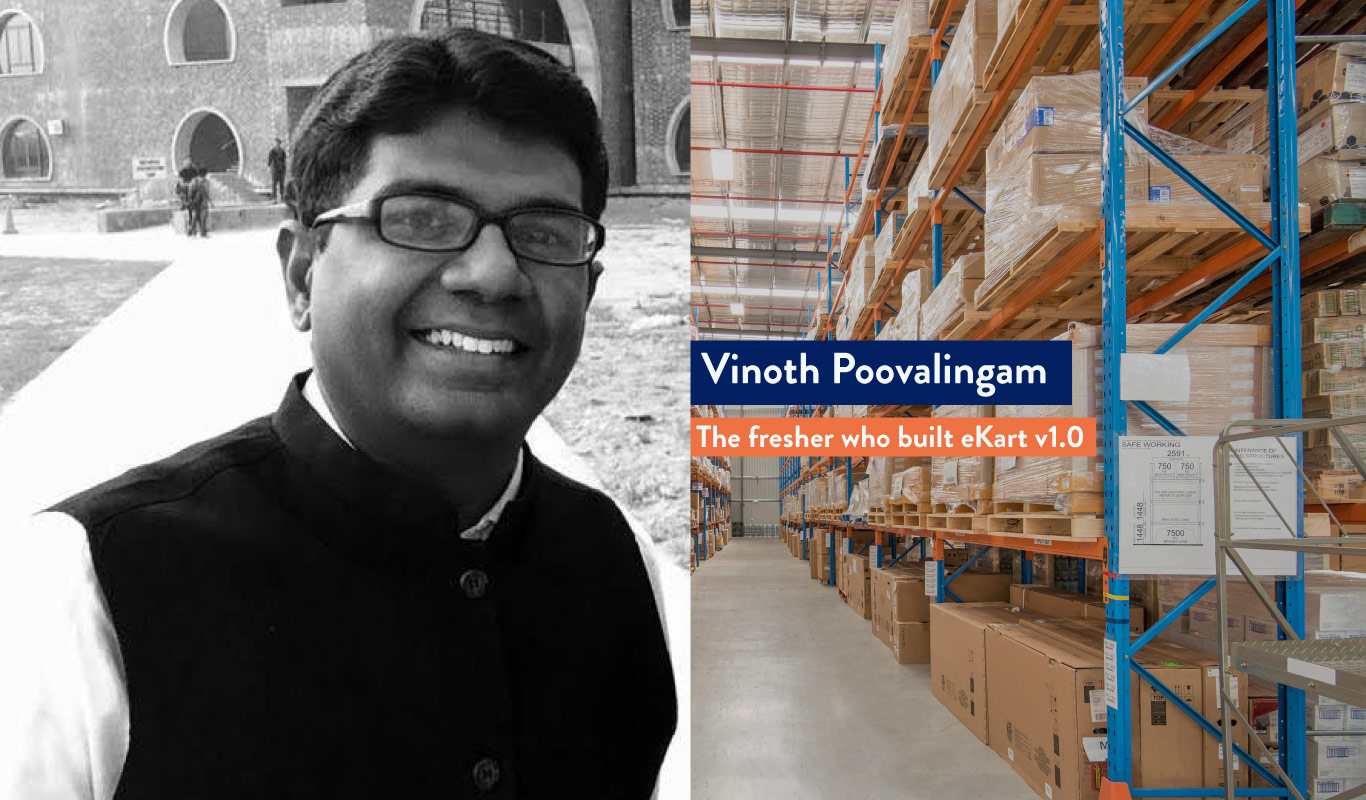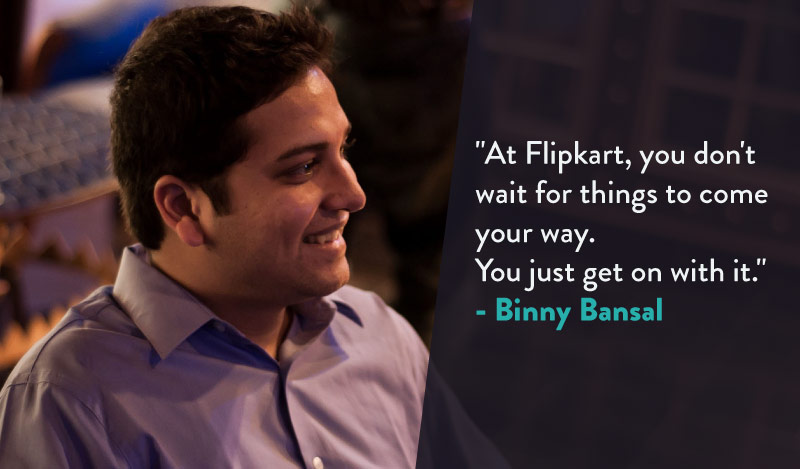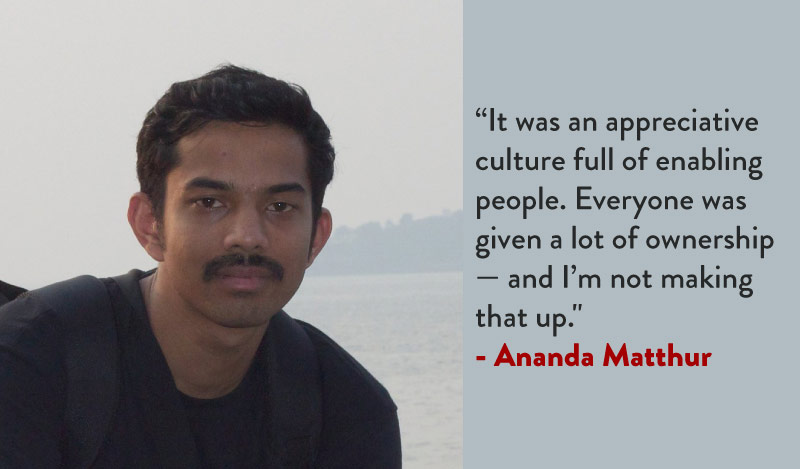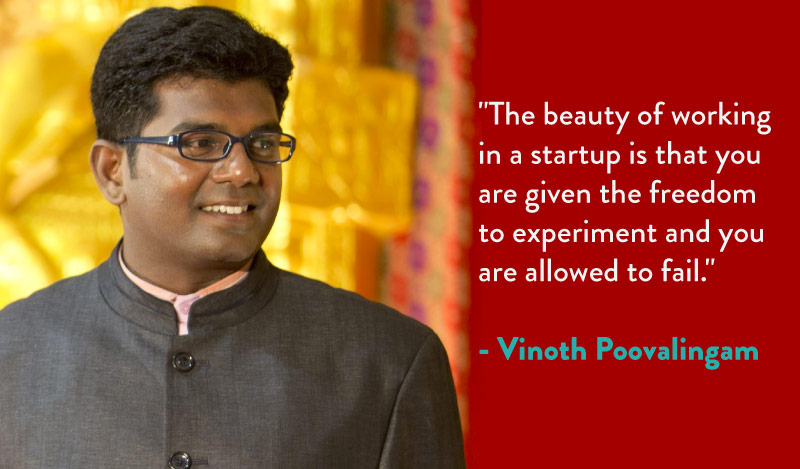In 2010, an inexperienced B-school graduate built the foundation of Flipkart’s game-changing outbound logistics organization. Vinoth Poovalingam, who took eKart from the drawing board to reality, reflects on the excitement of his roller-coaster ride as a Flipster

In 2010, Flipkart pioneered an owned outbound logistics capability. What started as an optimistic local-area experiment laid the foundation for eKart, a trailblazing business-to-consumer outbound logistics organization that expanded rapidly to power the startup’s supply chain strengths and cemented its leadership of India’s nascent e-commerce market. Everybody knows that story. But have you heard the backstory? The task of building this innovation powerhouse, from scratch, was thrust into the hands of a fresher, a young B-school graduate named Vinoth Poovalingam.
Vinoth, one of Flipkart’s first campus hires, was a greenhorn. His only prior work experience was a summer internship with Britannia while pursuing his postgraduate degree at the Indian Institute of Management – Bangalore (IIM-Bangalore). Two years before that, he had graduated from the Indian Institute of Technology – Madras (IIT-Madras) at Chennai. Like his classmates, he could have easily swung a fat corporate job. His friends jeered when he accepted an offer from Flipkart, a barely three-year-old Indian online shopping startup that had just expanded beyond selling books.
“I wanted to get into operations and my eventual idea was to be an entrepreneur,” recalls Vinoth. “I was hopeful that this job would pave the way for me.”
Flipkart, at the time, functioned out of a quiet lane in Koramangala, a leafy Bengaluru neighborhood that counted among its celebrity residents Infosys co-founder Nandan Nilekani, healthcare entrepreneur Dr Devi Shetty, entrepreneur-turned-lawmaker Rajeev Chandrasekhar, and award-winning author Ramachandra Guha. It was also home to dozens of small businesses and startups operating out of makeshift offices in apartments. One of them was the Flipkart headquarters.
“It was actually a house,” Vinoth recalls. “And we started Flipkart Logistics [which later became eKart] out of its garage.” With a cheeky laugh, he adds, “I was its first general manager… plus delivery boy!”
First you innovate, then you pay the price
Vinoth’s first assignment at Flipkart was with the team that launched Cash-on-Delivery (CoD), the path-breaking innovation that allowed customers to place orders online and pay for them in cash at the time of delivery. Although full of potential in concept, in reality it was a move fraught with risk and uncertainty.
“The NPS – Net Promoter Score – for CoD was very bad,” recollects Binny Bansal, Flipkart co-founder and then the chief operating officer. Net Promoter Score, considered a key indicator of loyalty, is an index ranging from minus-100 to plus-100 that measures customers’ willingness to recommend a company’s products or services to others. “We worked tirelessly with the courier companies for six months to improve the NPS, but they just did not have the systems and processes. For them, too, it was a first move and they were not agile.”
“Logistics in the country was pretty screwed up at that time,” reflects Vinoth, mincing no words. He observes that it essentially existed for the business-to-business (B2B) segment. Business-to-consumer (B2C) small parcel logistics hadn’t even been thought about. To top, CoD seemed an otherworldly idea. However, it was something that had always been on Flipkart’s radar.
“The idea of CoD was there before I joined,” says Vinoth, who had been hired as an assistant general manager. “Sachin [Bansal] and Binny already had a plan for it and were identifying players who could partner with us to introduce CoD in the market. But the partners weren’t ready, system-wise, to make it happen. For them, CoD actually meant cheque-on-delivery. Collecting hard cash in small denominations of ₹50 and ₹100 was a big headache for them and they quoted a very steep price for it. Only one logistics partner, Aramex, was willing to handle CoD.”
“After struggling with third-party couriers, we decided that we should do a pilot of our own,” says Binny, who was obsessed with improving the NPS.
CoD opens new doors
CoD opened doors for Flipkart. It was evidently a game-changer but there were wrinkles to be ironed out. Flipkart, at the time, spent nearly 2.5% of its revenue on commissions paid out to third-party logistics partners. It made sense now to moot the idea of an owned outbound logistics service, where Flipkart could have greater control over delivery efficiency and stem the revenue bleed. That put Vinoth’s project on the fast track.
Vinoth’s manager was Sujeet Kumar, who was responsible for overseeing supply chain, warehousing and logistics functions at Flipkart. “I also used to have a weekly meeting with Binny where I reported on my progress,” remembers Vinoth. Binny asked him to work immediately on setting up a delivery network. “He said that we should do this in a planned way, with technical support and more people,” Vinoth says.
Chuffed to have the backing of the leaders, Vinoth relaxed and waited. However, the support he expected never came. Two weeks later, Binny sternly demanded to know why the project hadn’t got off the blocks. Vinoth was at a loss for words.
“At Flipkart, you don’t wait for things to come your way,” says Binny, recalling the moment. “You just get on with it.”
“Binny told me that we would do it, learn from it, and build systems on the go,” remembers Vinoth. That was his initiation into three key values that formed the foundation of the Flipkart way of working: Audacity, Ownership, and Bias For Action.
Getting on with it
Binny did not lose faith in Vinoth’s ability to deliver on the promise. “He was full of energy,” says the co-founder, who is currently Flipkart’s Group CEO. “He was smart and determined and hard-working. And he took great end-to-end ownership.”
Binny gave Vinoth two systems and a bar-code scanner and told him to get started. The pilot began with four or five PIN codes in the nearby suburbs of Koramangala and Indiranagar.
“We hired three delivery boys and a hub manager, and among them we managed about a hundred deliveries a day,” says Vinoth, adding that the deliveries were tracked on spreadsheets and with bar codes.
Flipkart’s first full-time employee, Ambur Iyyappa, was an ace at spreadsheets. He also had prior experience in logistics, having cut his teeth as a delivery boy with First Flight Couriers. Iyyappa’s contacts in the industry and his domain expertise proved invaluable for Vinoth. Iyyappa facilitated his visits to third-party warehouses to gain insight into the machinations of the logistics process. This gave Vinoth an intimate understanding of the business.
“He’s a really nice guy,” Vinoth says of Iyyappa, praising Flipkart’s ‘Human ERP’ for his calm demeanor and grace under pressure.
Apart from his manager Sujeet, Vinoth interacted frequently with Flipkart’s then technology head Mekin Maheshwari for high-level escalations. Along with former Flipsters Maneesh Mittal (former Vice President – Operations), Marcus Terry (then Senior Manager – Customer Support) and Patanjali C (a fellow campus hire from IIM-B who worked on inbound logistics), he was part of a tightly knit operations team that took the outbound logistics service from strength to strength.
Scaling up
When it was time to scale up and automate the manual operations of Flipkart’s spanking new outbound logistics system, in came Ananda Matthur.
“My first few days at Flipkart were spent delivering shipments on a TVS Scooty!” recollects Ananda, who joined Flipkart as a senior software engineer in October 2010 from Bloomberg in New York, where he had worked briefly after graduating from Columbia University. “I used to sit with Sachin on one side and Mekin on the other, and across the table sat Binny. It was arguably the most dangerous place in the office!”
“On my very first day, Binny told me that I would be working on the outbound logistics project,” recalls Ananda. “Vinoth was already working on it. By the time I was ready with the software, Vinoth had set up a manual process for deliveries — he had defined the hubs and worked out how to move shipments between warehouses.”
Together with another engineer, Swapnil Marghade, and supported by a product manager, Rahul Ramkumar, Ananda started working on the logistics piece. The logistics function was owned by the supply chain group, which was then one of three core engineering groups at Flipkart (the others were the website and the catalog management system).
“Whatever we were doing on spreadsheets was migrated into the system,” says Vinoth. Over time, as it evolved and stabilized, more functions were added. “Everyone in the team won an internal award for being star performers,” he recollects with a smile.
The first version of the software was rolled out in three weeks, recalls Ananda. “We used to go to each new hub and demonstrate the system, training hub managers to use it,” he says. “Operationalization — getting the system off the ground — was something we did ourselves for the first few hubs. After that, hub managers became the end users. From the back office, we would monitor it, looking out for errors.”
Despite the frenzied pace of work, Ananda remembers the environment at Flipkart as being very welcoming. “It was an appreciative culture full of enabling people,” he says. “Everyone was given a lot of ownership — and I’m not making that up. I was allowed to choose the tech stack, the language, and the database that I wanted to code in.”
Screwing up… well, almost!
“After a month of two of operations, people started tweeting good things about us,” Vinoth remembers. Flipkart’s delivery efficiency suddenly became the talk of the town, particularly in Bangalore where happy customers took to social media to praise it. That this success came at a time when traditional courier services were messing up online shopping orders was particularly encouraging, Vinoth says.
Dear @Flipkart, Did I tell you how amazing you are! Got my books just in time for the weekend. Ah! The smell of fresh paper…#fb
— Shilpika Das (@ShilpikaDas) June 25, 2010
Ordered a book from @flipkart yesterday evening. It is at my desk this afternoon. This is awesome #flipkart
— Balaji Narayanan (@balajijegan) July 1, 2010
https://twitter.com/oneblackcoffee/status/16911817861
Quite impressed with flipkart. Ordered Dork @Sidin on sat, delivered monday 11 AM.
— **Gopinath** (@gopibella) June 28, 2010
Ordered Flow: The Psychology of Optimal Experience from Flipkart and have it in less than 13 hours
— Ramprasad (@rampr_) December 1, 2010
SICP book delivered by @flipkart in just under 24 hours. #awesome !
— Amit Sharma (@am_sharma) November 25, 2010
@flipkart Very impressed! Ordered yesterday and got the book today. Outstanding
— St_Hill (@St_Hill) November 25, 2010
It was not all smooth sailing, though.
“A few things did go wrong,” recalls Ananda. “Our Noida hub was robbed. And we weren’t prepared for a technical way to handle loss; we had to do that manually.”
Vinoth Poovalingam was beset with other nightmares. “Binny gave us the freedom to go full throttle, but he also pulled us up for the smallest misses,” he says.
One month into operations, the outbound logistics team received a curt email from Sachin Bansal. The then-CEO complained that he had placed an order but had not received delivery of it. Stinkers flew thick and fast. Under fire, Vinoth and his team scrambled to locate the bug in the works. The delivery boy, who was summoned, swore that there had been no one at the address that Sachin had specified. Digging deeper, the team found out that the fault did not lie in their system. An absent-minded Sachin had provided the address of his old apartment while placing the order!
eKart v1.0 takes off
Flipkart Logistics became a viable business idea in about three months from the start of the pilot.
“To be very frank, we started it as an experiment,” recalls Ananda Matthur, who moved on from Flipkart in May 2016 to ClearTax, where he is now Director of Engineering. “From a software perspective, some of the code I wrote back then seems to be still working — I don’t know if that’s a good thing or a bad thing!”
“We kept a close watch on the initiative,” says Binny. “Once the pilot was successful, it was clear that this would be a core part of our business. Within a couple of months, we figured out that the NPS of our own deliveries was 50 per cent higher than that of other courier partners. Then we threw more resources into it. And soon we expanded to 20-30 cities.”
“The beauty of working in a startup like Flipkart is that you are given the freedom to experiment and you are allowed to fail,” says Vinoth. “And if you do, you can quickly move on. We were never questioned for trying and failing. We were only questioned if we promised something that ran according to a defined process, and did not deliver on it.”
At Flipkart, Vinoth declares, inexperience was good. “More than being seen as a challenge, it ended up being a positive thing,” he says. “No one dictated terms to us. We were always exploring new ways to get things done.”
Vinoth Poovalingam, who moved from Flipkart to Amazon.in within a year of launching eKart, found a stark contrast between the two cultures. “At Amazon, they valued my Flipkart experience a lot. My boss had come from FedEx and had some 25 years’ experience in logistics. It was a different kind of culture there — a lot of grey-haired guys told us what to do. To which I used to tell them: ‘Boss, this won’t work. I’ve tried this already!’”
Today, Vinoth has given wings to his own entrepreneurial dreams. As co-founder and CEO of Hocalwire, he leads a startup that provides newsroom management and revenue optimization solutions for media houses.
How Vinoth Poovalingam earned the keys to the kingdom
The question is hard to ignore: How did a fresher just out of B-school, a greenhorn to e-commerce and the logistics business, have such faith and conviction that he could get a revolutionary idea to succeed? And how could the founders of Flipkart, up against great odds and competition from a global leader in e-commerce with deep pockets, trust a novice with the keys to the kingdom?
“That’s the way we do things at Flipkart,” says Binny Bansal. “We take an idea, we try it out and, if it succeeds, we put everything behind it. And, yes, we hire smart people. We give them interesting challenges to solve. From the beginning, in this company, we have seen a lot of success with that.”
Read more stories of exceptional Flipsters in our series FlipTales and seminal moments from 10 years of Flipkart in Inside Flipkart. Looking for jobs at Flipkart? Head over to Flipkart Careers and find your fit!







